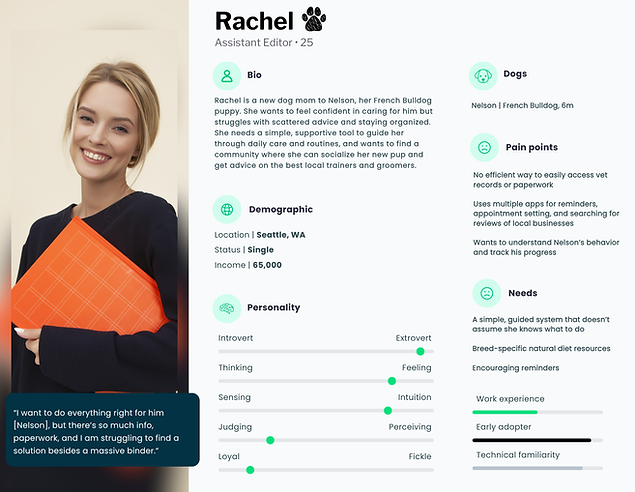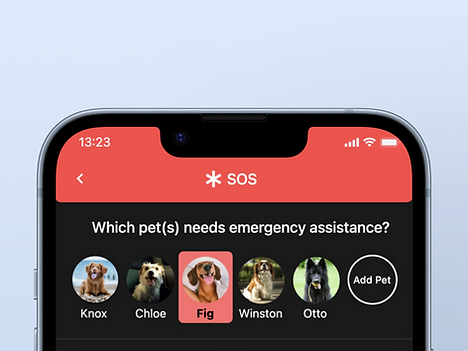
Whooza is an all-in-one pet care and management app that helps pet owners track wellness schedules, appointments, nutrition, and growth. Users can manage multiple pets, get reminders for vaccines and grooming, keep vet visit records, and access expert tips.
"Whooza good boy?"
The Challenge
How can we design a dashboard that makes managing multiple pets simple, encourages users to engage with wellness reminders, and ensures the onboarding process is frictionless?
Pet care apps often overwhelm users with information upfront, making it hard to find key actions like setting vaccinations, booking grooming, or logging health updates. For Whooza, my goal was to create a dashboard that is intuitive, engaging, and builds trust with pet owners from day one.
RESEARCH
I studied top pet care and general health management apps to understand what makes dashboards effective. Key findings:
-
Clear status overview: Users need to see upcoming tasks, overdue items, and progress at a glance
-
Easy onboarding: Quick, simple setup for each pet encourages continued engagement
-
Visual trends: Tracking pet health metrics over time builds context and reassurance
-
Strong reminders: Push notifications and in-app cues help users stay consistent
INTERVIEWS
To begin, I wanted to understand the challenges modern pet owners face when managing their pets’ daily needs, how they react in high-stress situations (like illness or emergencies), and where the biggest gaps in their care tools currently exist.
I wanted to learn:
-
What systems they use (if any) to track health, training, or care
-
Where they feel most stressed or uncertain in their pet parenting journey
-
What features they wish existed, or what they've tried that failed
-
How they prefer to receive care reminders or educational content
-
Whether they value community feedback
So I asked questions like:
-
How do you currently manage your pet’s health, grooming, and daily care?
-
What problems do you face while tracking these tasks?
-
Have you ever missed an important vet appointment or vaccination?
-
How do you usually remember feeding times, grooming sessions, or medications?
-
What would make managing your pet’s care easier for you?
Following were the highlights from the interviews:

I discovered that managing multiple pets can be overwhelming for users. While caring for a single pet is usually manageable, adding multiple pets introduces complexity; users have to remember different vaccination schedules, grooming appointments, and dietary needs. Many users expressed that it’s hard to get a clear overview of everything at a glance, and current apps don’t provide an easy way to see all pets’ wellness tasks in one place.
How might we design a dashboard that makes managing multiple pets simple, clear, and engaging for users?

I have a reminder app for vet visits, my camera roll for vaccine cards, and then my notes app for things like his weight, his diet, and when I gave him his medicine.
One app tracks her meds, another is for training videos, and I'm in a Facebook group for questions. I wish it all lived in one place.
I always mean to keep track of his poop or when I last gave him flea meds, but there's no way to log that unless I write it on paper.
Sometimes I just Google stuff and hope it's right. Like, is he supposed to be eating this much? Should I call the vet? I never really know.
When my dog ate something weird, I freaked out. I didn't know what was toxic or which vet was even open at that hour, I just panicked.
I write everything on paper, but they always get lost. I need something that my wife and I can both access to stay on the same page.
INSIGHTS
I condensed my research findings into the following insights:

1. Care is fragmented across too many tools
Most users rely on a patchwork of apps, calendars, saved social media posts, written and mental notes to track health, food, training, and emergencies. This scattered system creates friction and leads to missed or delayed care.
2. Confidence varies, but almost everyone wants reassurance & community support
Newer pet owners crave clarity and guidance, while experienced owners want validation and oversight. Regardless of experience level, most users aren't sure they're doing "enough", especially with preventative care, training, and socialization.


3. Emergencies highlight a major information gap
In urgent moments, users feel panic, not because they don't care. but because they don't know what to do. Having trusted resources (like vet contacts or toxic food database) instantly accessible is a major need.
4. Daily wellness isn't often tracked, but it should be
Mood changes, diet reactions, or unusual behavior are often forgotten or dismissed. Users expressed a desire for lightweight tracking tools to log small-but-important shifts over time, as well as symptoms to present to a vet if needed.


5. Multi-pet households amplify the challenge
Owners with more than one pet find it especially hard to keep everything straight. Each pet may have different needs, timelines, behaviors, yet most tools treat pet care as "one-size-fits-all".
6. Users want passive structure, not pressure
Most interviewees want reminders, insights, and organization, but not constant notifications. The ideal solution should be smart, gentle, and user-centered.


7. Owners want to make more informed nutrition decisions
Users are increasingly conscious of what goes in their pet's body, from avoiding harmful ingredients to exploring raw or homemade diets and treats. They want education, customization, community and tools to help them feel confident in the food decisions they're making everyday.
USER PERSONAS
Based on the insights gathered from the research phase, I made three personas: single person and single pet, single person and multiple pets, and households with shared responsibilities of pet(s).

.png)

Kyle's persona and journey map


Olivia's persona and journey map


Rachel's persona and journey map
CONCEPTUALIZATION
After gathering insights from research, I mapped out the key screens and relationships that would shape Whooza's experience. The focus was on creating a structure that's intuitive for both first-time pet owners; emphasizing clarity, quick access, and gradual discovery of features as users grow more comfortable with the app.
USER FLOW
To visualize how users would move through the app, I designed a primary user flow centered on adding a new pet profile, one of the first and most essential actions.
This flow ensures minimal friction, guiding users step-by-step from setup to engagement while reinforcing Whooza's goal of making pet care feel organized and approachable.
INFORMATION ARCHITECTURE
The information architecture organizes Whooza into five key sections: You, Pets, Providers, To-Dos, and Appointments, designed for intuitive navigation and streamlined access to the most important features. Each section focuses on a core aspect of pet care management: from maintaining pet profiles and tracking wellness to managing providers, staying on top of daily tasks, and connecting with the community. This structure ensures a cohesive, user-centered experience where every interaction feels natural and purposeful.

SOLUTIONS

Explore nearby providers, check availability, and add them directly to your pet’s profile for easy scheduling.
FIND CARE YOU CAN TRUST.
.png)
Create color-coded to-do’s for vet visits, medications, and daily care, perfectly sorted by pet so nothing slips through the cracks.
STAY ORGANIZED, ONE PAW AT A TIME.

.png)
MEET YOUR PET'S DIGITAL PROFILE.
Record their breed, birthday, quirks, and care details, from diet and medications to insurance, to keep their info neat, complete, and ready to share.




INSTANT HELP, WHEN IT MATTERS MOST.
In SOS mode, select the pet in need, find the nearest vet hospital, call your vet, alert emergency contacts, and access tools like the toxic food database, first aid guide, and pet medical ID, all within seconds.
DESIGNED TO MAKE PET CARE FEEL FUN.
Clear icons, cheerful visuals, and an easy-to-navigate layout bring warmth and simplicity to every screen, keeping the experience light, helpful, and full of heart.

